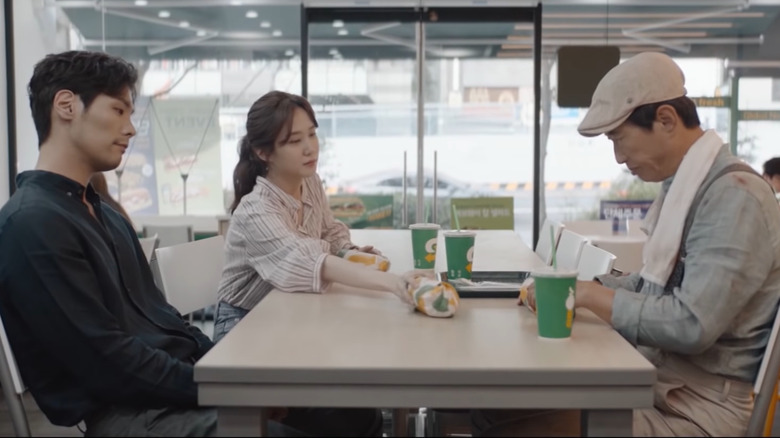Here's How Subway Sandwiches Became Stars In Korean Dramas
The appearance of sandwich chain Subway in Korean television dramas has evolved from the occasional product placement to practically an integral part of the genre. "People joke, 'If I had a drink every time Subway popped up, I'd be drunk before the first half is over,'" Jae-Ha Kim, a Chicago-based evaluator of Korean dramas, told The New York Times in March. The Times notes this product placement has begun to alter plots: for example, one character is given a Subway sandwich in an attempt to stave off his suicidal ideations. That's how pervasive it is.
Even in 2018, an article for Kajo Mag noted the chain's omnipresence. From doctors on dates to the Grim Reaper on a break, in Korean drama, everyone eats Subway.
As The New York Times explains, this phenomenon is due to Korean television regulations. Advertising breaks do not occur during the programs, so the only way for these programs to make advertising money (and for businesses like Subway to reach a television audience) is through belabored product placement. More importantly, as Korean drama developed an international fanbase, the number of people subjected to the infernally eternal product placements increased in tandem.
According to Colin Clark, the "country director" for Subway in South Korea, this strategy has been a success. "I swear to you, it was a difference between night and day — before the product placement and after the product placement — the effect it had on the customers," he told The New York Times.
Product placement can work if done well
Although their incessant presence in Korean television has pushed some viewers to despise Subway, evidence shows some product placement can create the "night and day" difference that Clark said happened with Subway.
Better Marketing found that both Reese's Pieces and Ray-Ban Sunglasses saw massive sale surges after appearing in "E.T." and "Top Gun," respectively. The piece, however, does note the products have to be relevant to the plot for the ad to work. Otherwise, the advertising factor becomes too powerful. Similarly, they caution against rupturing the integrity of the show for the product, a lesson Subway seems in need of learning.
The reason why product placement would work in these situations, Psychology Today writes, is that by placing the product in the background or in a character's hands, the products play upon our "implicit self-identification." In other words, sometimes we may want to identify with a character by buying the product they bought.
As the piece notes, product placements can influence purchasing even when people explicitly state that the practice feels manipulative. So, even though some complain about the constant exposure to Subway advertisements in Korean dramas, that expressed weariness may not necessarily stop them from buying Subway. Though, of course, it could as well. Subway may want to tone it down a bit.

